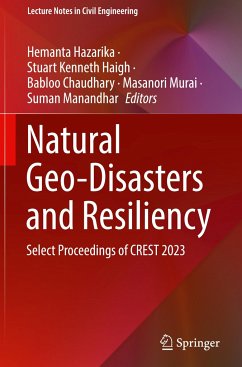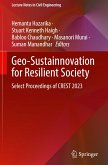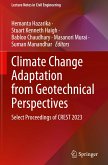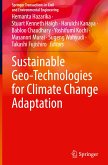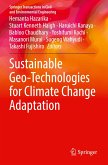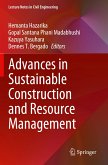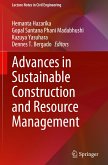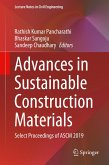Natural Geo-Disasters and Resiliency
Select Proceedings of CREST 2023
Herausgegeben:Hazarika, Hemanta; Haigh, Stuart Kenneth; Chaudhary, Babloo; Murai, Masanori; Manandhar, Suman
Natural Geo-Disasters and Resiliency
Select Proceedings of CREST 2023
Herausgegeben:Hazarika, Hemanta; Haigh, Stuart Kenneth; Chaudhary, Babloo; Murai, Masanori; Manandhar, Suman
- Gebundenes Buch
- Merkliste
- Auf die Merkliste
- Bewerten Bewerten
- Teilen
- Produkt teilen
- Produkterinnerung
- Produkterinnerung
This book presents select proceedings of the 2nd International Conference on Construction Resources for Environmentally Sustainable Technologies (CREST 2023), and focuses on sustainability, promotion of new ideas and innovations in design, construction and maintenance of geotechnical structures with the aim of contributing towards climate change adaptation and disaster resiliency to meet the UN Sustainable Development Goals (SDGs). It presents latest research, information, technological advancement, practical challenges encountered, and solutions adopted in the field of geotechnical…mehr
Andere Kunden interessierten sich auch für
![Geo-Sustainnovation for Resilient Society Geo-Sustainnovation for Resilient Society]() Geo-Sustainnovation for Resilient Society161,99 €
Geo-Sustainnovation for Resilient Society161,99 €![Climate Change Adaptation from Geotechnical Perspectives Climate Change Adaptation from Geotechnical Perspectives]() Climate Change Adaptation from Geotechnical Perspectives166,99 €
Climate Change Adaptation from Geotechnical Perspectives166,99 €![Sustainable Geo-Technologies for Climate Change Adaptation Sustainable Geo-Technologies for Climate Change Adaptation]() Sustainable Geo-Technologies for Climate Change Adaptation81,99 €
Sustainable Geo-Technologies for Climate Change Adaptation81,99 €![Sustainable Geo-Technologies for Climate Change Adaptation Sustainable Geo-Technologies for Climate Change Adaptation]() Sustainable Geo-Technologies for Climate Change Adaptation81,99 €
Sustainable Geo-Technologies for Climate Change Adaptation81,99 €![Advances in Sustainable Construction and Resource Management Advances in Sustainable Construction and Resource Management]() Advances in Sustainable Construction and Resource Management121,99 €
Advances in Sustainable Construction and Resource Management121,99 €![Advances in Sustainable Construction and Resource Management Advances in Sustainable Construction and Resource Management]() Advances in Sustainable Construction and Resource Management121,99 €
Advances in Sustainable Construction and Resource Management121,99 €![Advances in Sustainable Construction Materials Advances in Sustainable Construction Materials]() Advances in Sustainable Construction Materials121,99 €
Advances in Sustainable Construction Materials121,99 €-
-
-
This book presents select proceedings of the 2nd International Conference on Construction Resources for Environmentally Sustainable Technologies (CREST 2023), and focuses on sustainability, promotion of new ideas and innovations in design, construction and maintenance of geotechnical structures with the aim of contributing towards climate change adaptation and disaster resiliency to meet the UN Sustainable Development Goals (SDGs). It presents latest research, information, technological advancement, practical challenges encountered, and solutions adopted in the field of geotechnical engineering for sustainable infrastructure towards climate change adaptation. This volume will be of interest to those in academia and industry alike.
Produktdetails
- Produktdetails
- Lecture Notes in Civil Engineering 445
- Verlag: Springer / Springer Nature Singapore / Springer, Berlin
- Artikelnr. des Verlages: 978-981-99-9222-5
- 2024
- Seitenzahl: 552
- Erscheinungstermin: 4. Mai 2024
- Englisch
- Abmessung: 241mm x 160mm x 34mm
- Gewicht: 1030g
- ISBN-13: 9789819992225
- ISBN-10: 9819992222
- Artikelnr.: 69451665
- Herstellerkennzeichnung Die Herstellerinformationen sind derzeit nicht verfügbar.
- Lecture Notes in Civil Engineering 445
- Verlag: Springer / Springer Nature Singapore / Springer, Berlin
- Artikelnr. des Verlages: 978-981-99-9222-5
- 2024
- Seitenzahl: 552
- Erscheinungstermin: 4. Mai 2024
- Englisch
- Abmessung: 241mm x 160mm x 34mm
- Gewicht: 1030g
- ISBN-13: 9789819992225
- ISBN-10: 9819992222
- Artikelnr.: 69451665
- Herstellerkennzeichnung Die Herstellerinformationen sind derzeit nicht verfügbar.
Prof. Hemanta Hazarika is currently a professor in the Graduate School of Engineering and Department of Interdisciplinary Science and Innovation, Kyushu University, Fukuoka, Japan. Professor Hazarika's research activities include disaster prevention and mitigation, soil-structure interaction, stability of soil-structures during earthquakes and tsunami, ground improvement, application of recycled waste and lightweight materials in constructions, stability of cut slopes, and landslides and their protection. He has more than 350 technical papers in various international journals, international conferences, workshops and symposia to date. He has also authored two textbooks on soil mechanics and their Japanese versions. In addition, Prof. Hazarika served as the editor of six books on diverse topics. Prof. Hazarika has several years of experience in teaching, research as well as geotechnical practice and consulting both within and outside Japan. He is currently a foreign expert of the world's first research center in Palu, Indonesia on liquefaction research called "The National Research Center for Liquefaction." Currently, Prof. Hazarika is the chairman of Asian Technical Committee on "Geotechnical Mitigation and Adaptation to Climate Change-induced Geo-disasters in Asia-Pacific Regions" of International Society of Soil Mechanics and Geotechnical Engineering (ISSMGE). He is also Founding President of a general incorporated corporation called GLOSS (Global Society for Smart Geo-Sustainnovation). Prof. Stuart Haigh is a professor in Geotechnical Engineering at Cambridge University and a fellow of Trinity College. In addition, Prof. Stuart Haigh is Assistant Director of the Schofield Centre. He has a wide range of research interests centered around physical modelling at 1g and utilizing centrifuges and numerical modelling using FE and MPM. His 25 years of experience in developing complex centrifuge experiments includes developing earthquake actuators, high-g robots, and an in-flight tunnel boring machine. He also delivered the Geotechnic Lecture on Mobilizable strength design for flexible retaining walls in November 2021. He has published more than 100 papers in several journals of repute. Dr. Babloo Chaudhary is an assistant professor in the Department of Civil Engineering at National Institute of Technology Karnataka (NITK) Surathkal, India. He completed his PhD from Kyushu University, Japan. He was a postdoctoral fellow at Kyoto University, Japan. His research activities include geo-disaster prevention and mitigation, dynamic soil-structures interaction, coastal geotechnics, renewal energy, ground improvement, energy geotechnics. His expertise extends from physical model tests, including 1g model tests and centrifuge model tests, to numerical simulation in the domain of geotechnical Engineering. He has published around 100 technical papers in various international and national journals, conferences,workshops and symposia. Dr. Chaudhary is recipient of Shri M.S. Jain Biennial Award given by Indian Geotechnical Society in 2017. Dr. Masanori Murai has had a distinguished career as a senior engineer with Shimizu Corporation, a leading construction company in Japan, after receiving his Ph.D. from Kochi University in Japan. Throughout his career, he has specialized in the field of geotechnical engineering and has played a key role in the design, construction, and maintenance of a wide range of infrastructure projects. In addition to his work on infrastructure projects, Dr. Murai has also been involved in research and development activities related to geotechnical engineering. He has published numerous papers in peer-reviewed journals and presented at conferences around the world, sharing his expertise and insights with other professionals in the field. Overall, Dr. Murai's career at Shimizu Corporation has been characterized by a strong focus on safety, sustainability, and innovation. His expertise in geotechnical engineering and commitment to excellence have made him an asset to the company and the field of engineering as a whole. Dr. Suman Manandhar is a Research Fellow in the Department of Civil Engineering at Kyushu University, Japan. He completed his post-doctoral research from Kyushu University and enhanced his career from a lecturer to guest/visiting associate professor at the Institute of Lowland and Marin Research, Saga University, Japan. He also served in different academic and professional sectors in Nepal. He is one of the founder members of Global Institute for Interdisciplinary Studies (GIIS) in Nepal. He has published more than 70 papers in refereed journal and proceedings in different SCI and Scopus-indexed journals. His major research areas cover risk sensitive land use plan and multi-hazard assessments, geo-disasters, DRRM, foundation, ground improvement, stability analysis, liquefaction analysis,numerical modeling, and compaction on embankment slopes.
PART I: Climate Change Related Natural Disasters.- Chapter 1. AI Based Slope Hazard Analysis of 2011 Niigata-Fukushima Heavy Rainfall Disaster in Japan.- Chapter 2. An Experimental Study of The Distance Effect Away from Earthquake Fault on the Soil Deformation Characteristics.- Chapter 3. An Experimental Study on the Effect of Herbaceous Plants against Concentrated Flow using RGB Image Analysis.- Chapter 4. An Experimental Study on the Phenomenon of Increase in Earth Pressure Acting on Integral Bridge Subjected to Reciprocal Load.- Chapter 5. Applicability and Effectiveness of Sheet-Type Sensors in Locating the Slip Failure During Seepage Through Embankments.- Chapter 6. Assessment of Landslide Potential for a Large-Area Forested Slope.- Chapter 7. Centrifugal Tilting Tests on Vertical Reinforcement of the Dry Masonry Retaining Wall.- Chapter 8. Centrifuge Modeling on Capture Performance of Tilted Open Type Sabo Dam.- Chapter 9. Characteristics of Debris Flow that Crosses Bhutanâs Mountain Roads and its Countermeasures.- Chapter 10. Effect of Grain Size Distribution of Bed Materials on Destabilization of a River Pier Due to Local Scour. etc.
PART I: Climate Change Related Natural Disasters.- Chapter 1. AI Based Slope Hazard Analysis of 2011 Niigata-Fukushima Heavy Rainfall Disaster in Japan.- Chapter 2. An Experimental Study of The Distance Effect Away from Earthquake Fault on the Soil Deformation Characteristics.- Chapter 3. An Experimental Study on the Effect of Herbaceous Plants against Concentrated Flow using RGB Image Analysis.- Chapter 4. An Experimental Study on the Phenomenon of Increase in Earth Pressure Acting on Integral Bridge Subjected to Reciprocal Load.- Chapter 5. Applicability and Effectiveness of Sheet-Type Sensors in Locating the Slip Failure During Seepage Through Embankments.- Chapter 6. Assessment of Landslide Potential for a Large-Area Forested Slope.- Chapter 7. Centrifugal Tilting Tests on Vertical Reinforcement of the Dry Masonry Retaining Wall.- Chapter 8. Centrifuge Modeling on Capture Performance of Tilted Open Type Sabo Dam.- Chapter 9. Characteristics of Debris Flow that Crosses Bhutanâs Mountain Roads and its Countermeasures.- Chapter 10. Effect of Grain Size Distribution of Bed Materials on Destabilization of a River Pier Due to Local Scour. etc.

